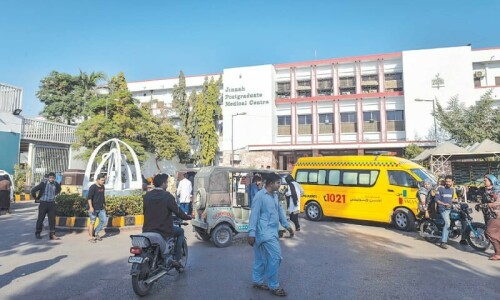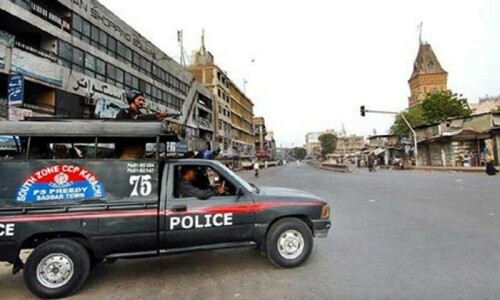KARACHI: “The development of Karachi was faster than the plans laid out for it by the British as low-income housing, schools, godowns, etc, developed informally and haphazardly as the need for them arose. The bureaucracy was also fine with this as they started doing the same,” said architect and town planner Arif Hasan.
He was speaking during his keynote address: ‘A yet undefined city’ at the inaugural and plenary session at the Winter School on ‘Cities, Urban Change and Heritage Management through Geotechnologies and Digital Humanities’, which looks at relations between heritage and territory.
The school, starting Monday, is being organised by the Institute of Business Administration (IBA) in collaboration with Centre for South Asian Studies in Paris (CEIAS, CNRS-EHESS) at the IBA, City Campus. The CEIAS and CNRS-EHESS stand for Le Centre d’Études de l’Inde et de l’Asie du Sud (CEIAS), of the l’École des Hautes Études en Sciences Sociales (EHESS) and the Centre National de la Recherche Scientifique (CNRS), Paris.
“Karachi’s land use, in spite of plans to the contrary, is being decided increasingly by large developers backed by politicians and not on the basis of environmental and social considerations. The coastal areas are also being reclaimed for similar purposes or for low-income housing,” said Arif Hasan.
First Social Sciences Winter School launched at IBA Karachi
He said that there were a few things shaping the future of Karachi in demographic and physical terms that needed further exploring. “One, Karachi is a non Sindhi-speaking capital of a predominantly Sindhi-speaking province. Many of its governance-related issues arise from this reality. This also gives rise to the constantly discussed question about who owns Karachi?
“Karachi is a city of migrants. But over the last four decades, the nature of migration here has changed. Earlier, it was mostly elders coming to the cities, mostly from Khyber Pakhtunkhwa, and then getting the younger siblings or children to follow. But today you see groups of young people from the rest of Sindh and the Seraiki belt, coming to Karachi while leaving their elders behind. Along with issues related to security, this has turned an already religiously divided society into ethnically segregated ghettos, which has resulted in the real estate and rental market’s changing its manner of operation and redefining social and gender relations,” he said.
“In the past, traders of different origins, relations and caste backgrounds played an important role in the development of Karachi. However, that has changed and the markets of Karachi are dominated by Pashto speakers,” he said, adding that all these elements and rapidly changing gender relations and family structures along with the application of hardly understood and imported planning vocabulary in which the planners were trained were shaping a still undefined Karachi.
“And a melange of these changes is also making the preservation and conservation of the city’s tangible and intangible heritage difficult,” he said.
Dr Anila Naeem, chairperson of the Department of Architecture and Planning at the NED University of Engineering and Technology, spoke about ‘Karachi’s heritage legacy: a crisis of management failures and misplaced priorities’.
She said that abandoned and vacant properties should not be left to the ad hoc whims of the market and that there was a need for framing proper policies for their appropriate usage.
She shared various examples where heritage buildings were left vacant for some reason or the other for several years to be then declared unsafe for use and dangerous. “And then while retaining the facades of these buildings, the interiors are slowly demolished to make way for new high-rises of 60 floors,” she pointed out.
Geographer Eric Denis from Geographe-Cities, CNRS-EHESS, Paris spoke about ‘The limits and extends of the urban world: between the Ecumenopolis and the subaltern urbanisation’.
He looked at the trend and spread of urban expansion and said that the definition of ‘urban’ remained extremely heterogeneous and, yet, a large part of the urban emergence was unseen.
Architect Yves Ubelmann from ICONEM spoke about ‘3D digital preservation of cultural heritage at risk’ while looking at 10 years of ICONEM’s works. “Heritage sites embody humanity’s cultural diversity. It is crucial that we document and preserve them now,” he said while showing how ICONEM’s team traveled the world, combining the large-scale scanning capacity of drones and the photo-realistic quality of 3D to create digital replicas of the most treasured places to record them for future generations.
Earlier, in his welcome address, the IBA executive director Prof Dr S. Akbar Zaidi spoke about the first Winter School and how it came to be at the IBA. He said that they had 50 participants this year of whom 14 were French. All would learn and interact with practitioners in urban space.
Geographer and co-director CEIAS (CNRS-EHESS), Dr Remy Delage, said that they were glad to be collaborating with IBA and hoped that all participants would enjoy the intense week of learning.
Co-director of CEIAS (CNRS-EHESS) and director of Research at CNRS, Michel Boivin, reminded that the collaboration between France and Pakistan actually went back to the 1950s when a French archeologist arrived in Pakistan for excavation in Sindh followed by more of their archeologists and social scientists coming here.
Published in Dawn, November 22nd, 2022












































Dear visitor, the comments section is undergoing an overhaul and will return soon.